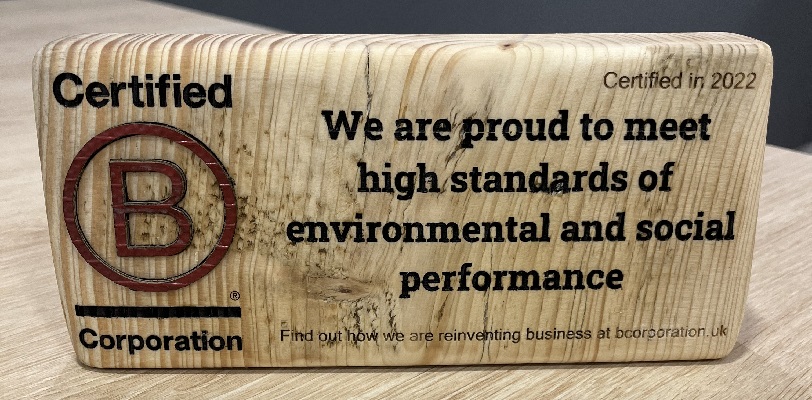Speaking with FSP Partnership, our we discussed BKL’s experience of becoming a Certified B Corporation.
‘BKL achieved B Corp certification last September. The pandemic had led them to learn a lot about the business and its people in that time as they thoroughly analysed and assessed their ways of working. Wanting to build on that and increase their focus on sustainability, achieving B Corp status seemed like a logical next step.
Initially they used the free [B Impact Assessment] tool (which is the B Corp assessment framework) to give them an understanding of their starting point – it gives you an initial B Corp score, which you can then submit to B Lab for official verification. Neville emphasises that “even if [businesses] aren’t ready to achieve B Corp accreditation, it’s a really useful benchmark to highlight potential issues within your operations.”
The B Lab accreditation process took 18 months because of the sheer volume of businesses applying to become B Corp during 2021. However, the company passed on the first go, and even achieved an Impact Business Model for how they work with their employees. It’s a robust process which made it this a huge achievement for the firm.
BKL didn’t appoint a consultant to assist them with the process – they worked their own way through the process, but could also see how helpful it could have been to work with an experienced consultant who knew their way through the process. Neville comments “external consultants are valuable but need to thoroughly integrate themselves into the organisation’s operations in order to provide the greatest benefit.” Ideally, an external consultant would team up with an experienced colleague within the company who can provide comprehensive data on C-suite – the two can then work in tandem to produce a plan.
As well as the huge amounts of data and evidence that needed to be gathered, a more commercial question arose in getting the partners to change the partnership agreement to include paragraphs to balance profit and purpose in all decisions – this is a fundamental point for the business, as it requires a legal sign-up. This went smoothly for BKL but could be a point of contention in other organisations.
Clients quickly realise they can put a tick in the ESG box by engaging with businesses that hold B Corp status. The accreditation gives them everything they need to know immediately rather than having to do multiple checks to make sure they meet their sustainability criteria. Indeed, Neville mentions that businesses have started to approach BKL in lieu of its competitors specifically because it holds B Corp status: a huge competitive advantage.
Internally as well, people can feel proud that they’re working for a forward-thinking, ethical company – a significant morale booster in a climate where people want to shoulder more societal responsibility. “BKL have just created a new role for an Impact Project Manager to ensure we continue these high ethical standards across all areas of the business.”’
The article, which also features fellow UK B Corps WHEB and Felloh, is available on the FSP Partnership website here.


